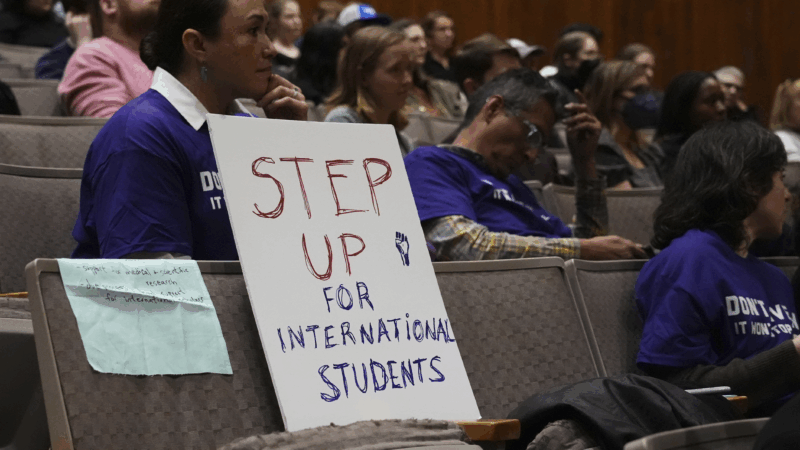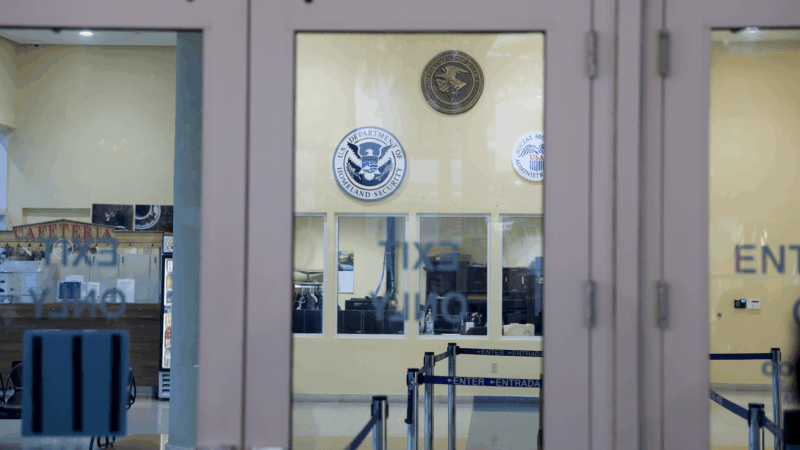Government says – for now – it will restore international students’ status
In a major reversal, the federal government is restoring the records of hundreds, and possibly thousands, of international students whose entries in a crucial database the government had abruptly terminated in recent weeks, a move that had complicated their ability to stay in the country.
Even before Friday’s announcement, dozens of judges across the U.S. had already issued temporary orders directing the government to restore students’ records in a database that Immigration and Customs Enforcement, or ICE, uses to monitor international students while they’re in the U.S. The database, known as the Student and Exchange Visitor Information System, tracks whether they are complying with the requirements to maintain their legal status. The SEVIS database also tracks schools’ disciplinary action against students or any criminal charges filed against them.
ICE had begun suddenly terminating thousands of students’ SEVIS records in recent weeks, in many cases over what lawyers say were minor disciplinary records that the government uncovered after running background checks. Without an entry in the SEVIS database, international students cannot easily adjust or extend their legal status, meaning many of those whose records were terminated would likely soon be forced to leave the country.
The database terminations were just one of many steps the Trump administration has taken to ramp up efforts to expel noncitizens – including those with and without legal status. Secretary of State Marco Rubio has also said he has revoked hundreds of visas, many for students who participated in pro-Palestinian campus protests last year.
International students whose SEVIS records were cancelled have filed nearly a hundred federal lawsuits across the country, a government lawyer said in a court hearing Friday.
At the start of that hearing before a federal judge in Washington, D.C., the lawyer read a statement announcing that students’ terminated SEVIS records would be restored, at least temporarily, while the government adopts a formal policy for revoking records in the database.
Brian Green, the attorney representing the plaintiff in that case, provided NPR with a copy of the statement that he said the government lawyer, Joseph Carilli, emailed him.
Green represents an American University student whose SEVIS record was canceled over an arrest that resulted in no charges, he said. He called the government’s announcement reversing course on its blanket revocations “a sigh of relief” for international students across the country. He said immigration attorneys have documented close to 5,000 students whose SEVIS records have been terminated in recent weeks. It’s unclear whether the government will restore all of them, or only those of students who have sued.
“The SEVIS records for plaintiff(s) in this case (and other similarly situated plaintiffs) will remain Active or shall be re-activated,” the government’s courtroom statement read.
The Departments of Justice and Homeland Security did not immediately reply to requests for comment.
Trump to raise global tariffs. And, most say the state of the union is weak, poll says
President Trump says he is raising global tariffs to 15%. And ahead of the president's address tomorrow, most Americans say the state of the union is not strong, according to an NPR poll.
U.S. has a quarter fewer immigration judges than it did a year ago. Here’s why
The continued drain of personnel from the already strained immigration court system has contributed to depleted staff morale, mounting case backlogs — and floundering due process.
Influencers are promoting peptides for better health. What’s the science say?
The latest wellness craze involves injecting these molecules for athletic performance, longevity and more. Scientists say the research isn't keeping pace with the health claims.
Poll: Most say the state of the union is not strong and the U.S. is worse off
Ahead of the State of the Union address on Tuesday, evidence continues to mount that President Trump is facing political headwinds.
The owners want to close this Colorado coal plant. The Trump administration says no
The Trump administration has ordered several coal plants to keep operating past their planned retirement, part of a larger effort to boost the coal industry. Two Colorado utilities are pushing back.
Mexico fears more violence after army kills leader of powerful Jalisco cartel
School was canceled in several Mexican states and local and foreign governments alike warned their citizens to stay inside following the army's killing of the leader of the Jalisco New Generation Cartel, Nemesio Rubén Oseguera Cervantes, "El Mencho," and the violence it spurred







